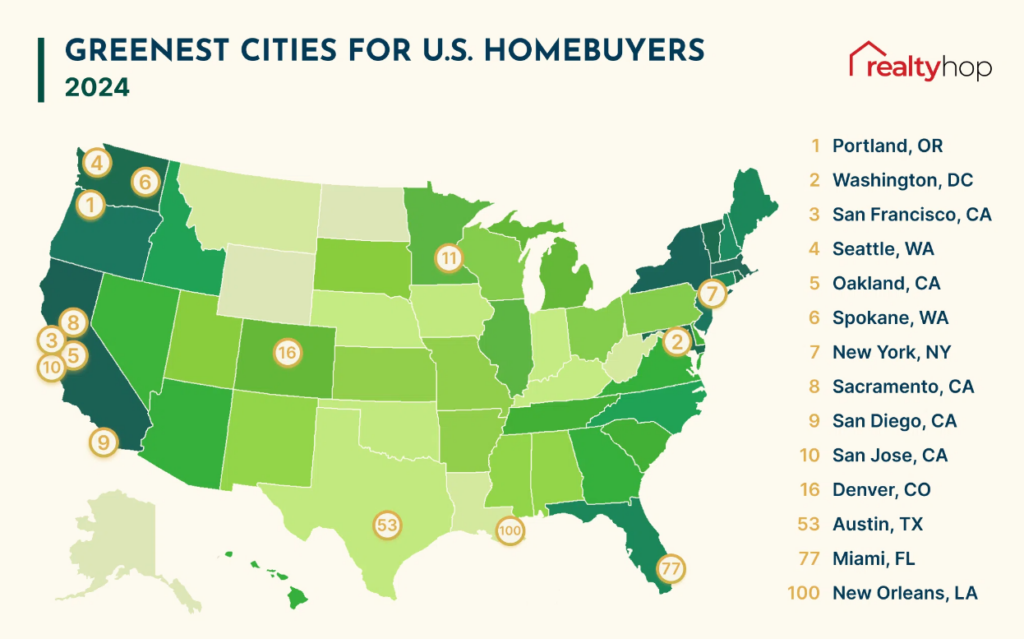More and more homebuyers are factoring in how green a city is when deciding on where to live. RealtyHop, in celebration of Earth Month this April, has crunched some data and compiled a list of the top 100 greenest cities in America. Cities were ranked in six categories: sustainability, policy and infrastructure, energy, environment, and affordability.
Key takeaways from RealtyHop’s analysis
- Portland, Oregon earned a crown of laurels as the “Greenest City in America.” The home of Voodoo Donuts has a strong renewable energy sector, an aggressive sustainable policy, and relatively low housing costs.
- On the other end of the list, New Orleans was determined to be the least green conscious city, as its location near the Mississippi River Delta makes it a target for severe storms that cause damage and consume resources.
- Eight of the top 10 greenest cities lay on the West Coast, six in California alone.
- San Francisco is the greenest city in California. The good news is that it has great sustainability and policy scores. The bad news is that it is one of the most expensive cities in America, with homeowners spending up to 62% of their income on housing costs alone.
Ranking the “Top 10 Greenest Cities in America”
- Portland, Oregon
By maximizing its renewable energy resources and policies to hit its goal of net-zero emissions by the year 2050, Rose City helps homeowners save money while living sustainably. Even better, it’s a relatively affordable housing market for a major city, with a median home price of $459,950.
- Washington, D.C.
The Capitol ranks first in environment, aiming to score net-zero emissions by 2045. Its strong parks systems and environmental policies earn it the label of the second greenest city in the U.S.
- San Francisco, California
The first California city in the top 10 earns its spot with its robust recycling regulations, innovative initiatives, and package-free refiller farmers’ markets, where you bring your own containers to buy everything from dry goods to shampoo.
- Seattle, Washington
Seattle scores highest in the energy category, using hydroelectric resources to supply carbon-free power and giving rebates for homeowners who switch from oil heaters to electric pumps.
- Oakland, California
The second California city on this list, and the most bikeable of the top 10, is working hard to become carbon neutral by 2045 using everything from recycling programs to environmental policies.
- Spokane, Washington
The third city in the Pacific Northwest takes advantage of local natural gas and hydroelectric resources, while boasting low emissions and pollution.
- New York City, New York
The first East Coast city on the list also scores first in sustainability, with over 75% of the workforce commuting via public transportation. Which is good, because NYC is also the least affordable city in this top 10.
- Sacramento, California
Not only does Sacramento have strong policy infrastructure and natural energy solutions, in 2021 they created an office to help reduce greenhouse gas emissions and embark on numerous initiatives on pollution and environmental justice.
- San Diego, California
Scoring number one in policy infrastructure, San Diego is on track to switch to renewable electric energy by 2035, halving its greenhouse gas emissions in the process. It’s a great city if you own an electric vehicle, with the strongest EV presence and implementation nationwide.
- San Jose, California
Scoring favorably in its policy and renewable energy sectors, Silicon Valley’s home base boasts solar farms that deliver clean energy to homeowners and is requiring all new construction to be 100% electric.
Measures taken to raise environmental awareness
Reps. Alexandria Ocasio-Cortez and Delia Ramirez, and Sen. Bernie Sanders recently reintroduced the Green New Deal for Public Housing Act in partnership with public housing residents, affordable housing advocates, and climate change activists. The Act aims to retrofit, rehabilitate, expand, and decarbonize the entire nation’s public housing stock through an estimated $162 to $234 billion investment over the next 10 years.
The Act would transition the entire public housing stock of the U.S., as swiftly and seamlessly as possible, into zero-carbon, highly energy-efficient developments that produce on-site renewable energy, expand workforce capacity and family self-sufficiency programs, and focus on community development.
Specifically, the Green New Deal for Public Housing Act would:
- Expand federal programs to provide residents with meaningful work investing in their communities, to own and operate resident businesses, to move toward financial independence, and to participate in the management of public housing.
- Expand resident councils so that public housing residents have a seat at the table for important decisions regarding their homes.
- Replenish the public housing capital backlog and repeal the Faircloth Amendment, which limits the construction of new public housing developments.
America’s least green cities?
And while the list highlights measures that have been taken in regards to carbon emissions, recycling, air quality, and energy consumption, the 10 cities on the other end of the spectrum rounding out the top 100 include:
- St. Petersburg, Florida
- Glendale, Arizona
- Fort Worth, Texas
- Irving, Texas
- Hialeah, Texas
- Houston, Texas
- Arlington, Texas
- Lexington, Kentucky
- El Paso, Texas
- Baton Rouge, Louisiana
The complete report, including a breakdown of each city’s score by category, can be found here.










